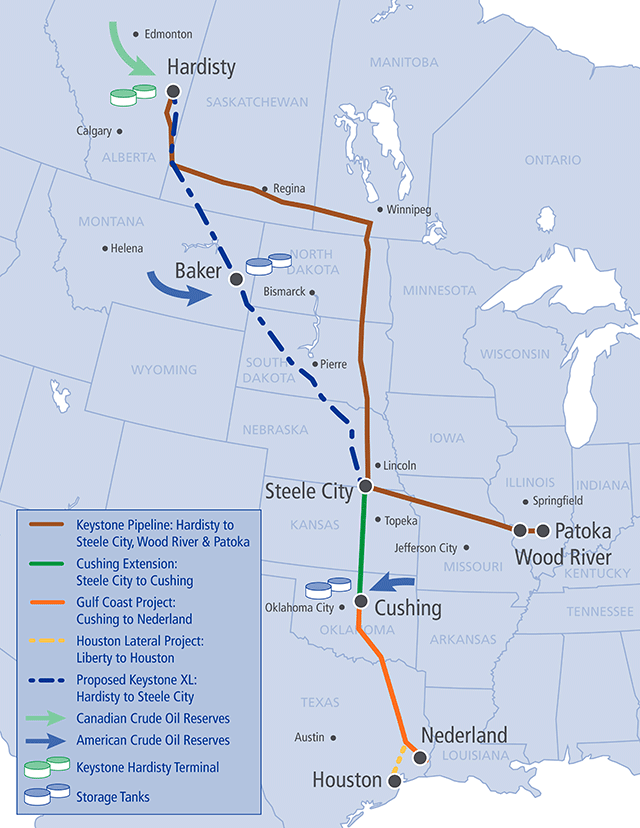The Keystone XL pipeline project is a proposed 1,179 Mile oil pipeline extended from Alberta to Nebraska. It is an extremely important infrastructure project for the energy security of The United States and for strengthening the American Economy. The pipeline transports oil from Canada but will also support production in The United States from producers in the Montana and North Dakota regions. It will allow Canadian and American oil producers access to large refining markets found in the American Midwest and along the U.S Gulf Coast. In 2012, TransCanada filed a new application for a Presidential Permit with the U.S Department of State as a requirement for building a cross-border pipeline. In 2013 the U.S Department of State approved TransCanada’s proposed route in Nebraska. The revised route will minimize disturbance of land, water resources and special areas in the state.
The pipeline will have enough capacity to transport up to 830,000 barrels of oil per day to Gulf Coast and Midwest refineries, reducing American dependence on oil from Venezuela and the Middle East by up to 40%. Keystone XL Pipeline will be the safest and most advanced oil pipeline operation in North America. It will not only bring essential infrastructure to North American oil producers, but it will also provide jobs, long-term energy independence and an economic boost to Americans.
Some quick facts About the Keystone XL Pipeline:
- 329 miles in Canada
- 840 miles in the Unites States
- 36-inch diameter pipeline
- capacity of 830,000 barrels per day

Some Disadvantages of the Pipeline:
- Building the Keystone pipeline and opening up the Tar Sands will negatively impact national and local economies. Burning tar sands oil will increase the earth’s temperature by a minimum of two degrees Celsius.
- The same fossil fuel interests pushing the Keystone pipeline have been cutting, not creating, jobs. In 2010 alone, the top five oil companies slashed their global workforce by 4,400 employees.
- Unemployment will rise
- Poor and working people will be disproportionately affected
- Building the sustainable economy, not the Keystone pipeline, will create far more jobs.Approving the Keystone pipeline locks our nation into a trajectory of guaranteed job loss and threatens the stability of the US economy.the solar industry continues to be an engine of job growth — creating jobs six times faster than the overall job market. Research by the Solar Foundation shows a 13% growth in high-skilled solar jobs spanning installations, sales, marketing, manufacturing and software development bringing total direct jobs to 119,000 people.
There are some hesitations though, about the Pipeline. It is questionable whether or not the project will make as much of a difference as they expect. Since June of 2014, crude oil has declined by 28%. This means that oil from new wells in Canada may command below what the expected cost will be to produce it. Also, the heavy oil extracted from sand in Alberta will cost between $85 and $110 to produce, depending on which drilling technology used not including the prices of drilling new wells.
Sources:
http://www.cnbc.com/id/102181913#.
You bring up a lot of good points about the potential costs of the pipeline. With that said, it does offer a lot for energy security purposes and oil extraction is already expanding regardless of whether the US takes advantage of it or not.
I do think we should continue to invest in renewable fuels, as you also stated.